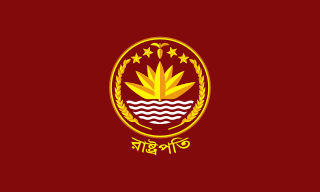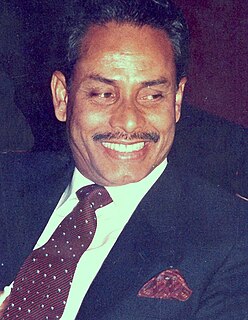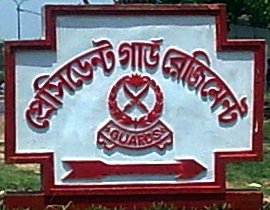
Ziaur Rahman was a Bangladesh Army officer and later turned politician who served as the President of Bangladesh from 1977 to 1981. He was assassinated on 30 May 1981 in Chittagong in an army coup d'état.

The Bangladesh Nationalist Party is a center-right nationalist political party in Bangladesh and one of the major political parties of Bangladesh. It was founded on 1 September 1978 by former Bangladeshi President Ziaur Rahman after the Presidential election of 1978, with a view of uniting the people with a nationalist ideology. Since then, the BNP won the second, fifth, sixth and eighth national elections and two Presidential elections in 1978 and 1981. The party also holds the record of being the largest opposition in the history of parliamentary elections of the country, with 116 seats in the seventh national election of June 1996. It has currently 9 MPs in parliament after 2018 national election.

The president of Bangladesh officially the President of the People's Republic of Bangladesh is the ceremonial Head of State of Bangladesh and Commander-in-Chief of the Bangladesh Armed Forces.

Hussain Muhammad Ershad was a Bangladeshi Army Chief and politician who served as the President of Bangladesh from 1983 to 1990, a time many consider to have been a military dictatorship.

Bangladesh has undergone several changes of government since its independence.
Syed Faruque Rahman was a coup member involved in toppling Sheikh Mujib regime in Bangladesh.He was convicted of murder and hanged on 28 January 2010 along with fellow co-conspirators Sultan Shahriar Rashid Khan, A.K.M. Mohiuddin Ahmed, Mohiuddin Ahmed, and Mohammad Bazlul Huda in Dhaka Central Jail, Old Dhaka, for the murder charges of Bangabandhu Sheikh Mujibur Rahman the founder & first President of Bangladesh. Sayed Faruque Rahman and his close ally Kahandaker Abdur Rashid were the chief organiser of the Assassination of Bangabandhu Sheikh Mujibur Rahman on 15 August 1975. He was 2IC of 1st Bengal Lancers Regiment of Bangladesh Army who led a group of Junior Army Officers in-order to overthrew the then regime of Bangabandhu Sheikh Mujibur Rahman and installed Khondaker Mushtaque Ahmed as President of Bangladesh.

Ziaur Rahman, the 7th president of Bangladesh, was assassinated by a faction of officers of Bangladesh Army, on 30 May 1981, in the south-eastern port city of Chittagong. Rahman went to Chittagong to arbitrate in a clash between the local leaders of his political party, the Bangladesh Nationalist Party. On the night of 30 May, a group of officers commandeered the Chittagong Circuit House, a government residence where Rahman was staying, shooting him and several others.
Muhammed Abul ManzurBU was a Bangladeshi military officer who commanded the Bangladesh Forces operations in Sector 8 during the Bangladesh Liberation War against Pakistan in 1971. He was allegedly involved in the assassination of the then-President of Bangladesh, Ziaur Rahman. The erstwhile Chief of Army Staff and alleged mastermind of Rahman's assassination, Hussein Muhammad Ershad, had put a standing shoot-to-kill order on Manzur's life—he was killed shortly after being captured at the border. About a year later, Ershad initiated a bloodless coup d'état and took over the Central Government, holding power until 1990.
The office of the Chief Martial Law Administrator was a senior and authoritative post with Zonal Martial Law Administrators as deputies created in countries such as Pakistan, Bangladesh and Indonesia that gave considerable executive authority and powers to the holder of the post to enforce martial law in the country in an events to ensure the continuity of government. This office has been used mostly by military officers. On some occasions, the office has been under a civilian head of state.

The President Guard Regiment (PGR) is a military unit under the Executive Office of the President of Bangladesh. It is located at Dhaka Cantonment, Banga Bhaban and Ganabhaban. It provides military support for all security functions; including presidential travel, general medical support, emergency medical services, and hospitality services. The PGR is headed by the Military Secretary to the President and the Commander, President Guard Regiment. The regiment was created by President Ziaur Rahman in 1976. It was originally designated as the Presidential Security Force. The PSF was restructured and upgraded to full regimental status by President Hussain Muhammad Ershad in 1982 and the new title of President Guard Regiment was adopted.

The history of Bangladesh (1971–present) refers to the period after the independence of Bangladesh from Pakistan.
The 1982 Bangladeshi military coup d'état deposed the civilian government headed by the President of Bangladesh Abdus Sattar and brought to power the Chief of Army Staff of the Bangladesh Army Lt. Gen. Hussain Muhammad Ershad. After serving initially as the Chief Martial Law Administrator, Ershad assumed the post of president in 1983 and ruled until 1990.

Presidential elections were held in Bangladesh on 15 November 1981. The result was a victory for the incumbent acting President Abdus Sattar of the Bangladesh Nationalist Party (BNP), who received 65.5% of the vote, beating his principal challenger Kamal Hossain of the Awami League. Voter turnout was 56.5%.
Ghulam Muhammed Quader, better known as GM Quader, is a Bangladeshi politician and the current chairperson of Jatiya Party. He is the incumbent Jatiya Sangsad member from the Lalmonirhat-3 constituency. He served as the Minister of Commerce and Minister of Civil Aviation and Tourism from 2009 to 2014.
Moinul Hossain Chowdhury was a Bangladesh Army officer who served as the adjutant general of Bangladesh army and former advisor of the caretaker government.
The 7 November 1975 Bangladesh coup d'état was a coup d'état launched by left-wing army personnel in collaboration with left-wing politicians from Jatiya Samajtantrik Dal. The coup killed Major General Khaled Mosharraf, who had himself led a coup against those involved in the assassination of Sheikh Mujibur Rahman. The coup also freed Ziaur Rahman from house arrest and allowed him to eventually seize power and become president.
3 November 1975 Bangladesh coup d'état was a military coup d'état led by Major General Khaled Mosharraf to remove the assassins of Sheikh Mujibur Rahman from power.
Nurul Islam Shishu is a retired General of Bangladesh Army, a vetern of Bangladesh Liberation war, and Bangladesh Nationalist Party politician. He served as the Minister of Agriculture under President Ziaur Rahman.








